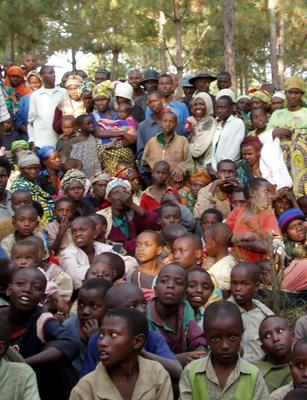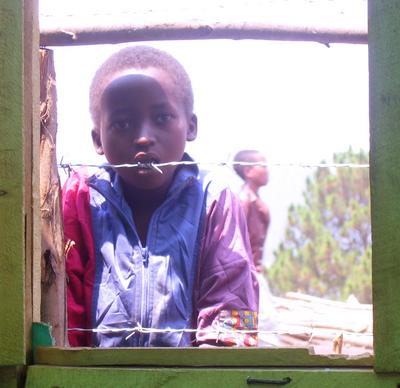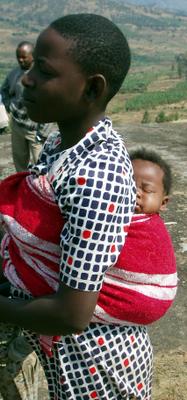I'm finally back in Byumba... which actually seems like a *huge* city compared to where I was in Ngarame... the following (sorry for the length - it's 4 days worth of journaling) is only such a small portion of what I've been experiencing. Sorry to be out of touch.. I am well and *loving* my time here... Ann (oh and nice work on the song, Shan... )
July 24, 2005 Sunday
Ngarame & Nyabeheke
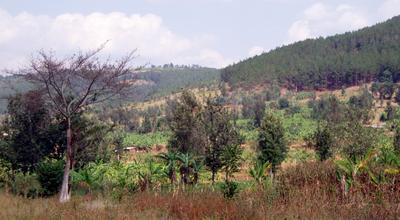 A view of the Rwandan countryside
A view of the Rwandan countrysideIt is a very bumpy rocky dirt road all the way from Byumba to Ngarame – I am tired and nauseated and far too foggy to attempt any French which is the only common language w/ my driver Ismael and I. We listen to African music until the radio goes out of range and Ismael fiddles with the radio in obvious dismay. I have the inspired idea of breaking out my ipod w/ radio transmitter and even have a South African gospel choir to put on Ismael perks up and says “blues, jazz?” And the universal language of music makes us both smile as I dial up Keb’ Mo.
The Rwandan countryside is so beautiful but I am not feeling well enough to appreciate the lush hillsides and tropical idyllic setting. Everywhere women clothed in bright colors are carrying loads on their heads – their ramrod straight posture putting even the most stylish of runway models to shame. They carry what must be 50 – 75 lb loads with such grace – barefoot – up slopes of such steepness.that I might only hope to scramble up using my hands to brace myself. Up up up they go without a missed step, their bundles secure on their heads.
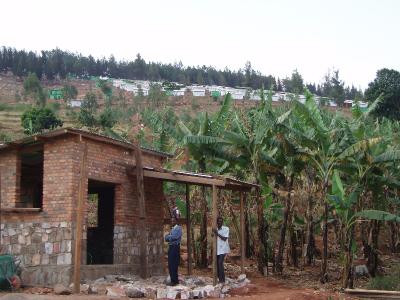 A view of Nyabaheke camp above the bore-hole / water pump
A view of Nyabaheke camp above the bore-hole / water pumpThe camp at Nyabeheke is truly a miracle. As Barry has explained – it was the only piece of land available for the ever burgeoning population of refugees coming from the Congo border region – those Tutsi’s fleeing the Interhamwe. The site had no water supply and through a remarkable combination of experience, skilled staff and just good intuition or grace as you might have it – a bore hole (the first one attempted) drilled hit water – enough to supply the entire camp. The water is pumped using a generator up the mountain to where the camp is situated and stored in huge reservoirs. They just had 3 months to prepare the entire camp from uninhabited uninviting steep stone slopes without water…
There are almost 5,000 refugees in the camp – most recently arrived in the past 2-3 months. The atmosphere in Nyabeheke is different than that of Gihembe. Maybe it’s because these are recent arrivals, but there doesn’t seem to be the inertia – the helplessness. Or maybe because of the way the camp is set up – with 5 structures surrounding a common kitchen area / 10 of those 5 units making up a neighborhood. We meet up with a group from the ARC board of directors who have been visiting all 3 camps and have a very warm welcome from the camp residents. The Mayor of Ngarame is here as well and he has been an essential partner in the building of the camp. Many villagers were hired to help build the camp and the mayor reminds us later that they can also use our help – the villagers that is, not just the refugees. Life is hard everywhere in Rwanda it is apparent.
A quick tour of the medical facilities shows a few patients with malaria and quinine infusions. Malaria is a huge problem in this camp and many of the staff have succumbed already. The camp leadership team are all a delight to meet: Theodore is from Benin and brought over personally by Barry where he had been working w/ Catholic Relief – Barry trained him 20 years back and called him in as a personal favor. The medical coordinator, Richard is from Kigali and has a cousin who is a nurse in Boston. Richard looks as if he could have stepped out of a Manhattan apartment. Clemens, Jean Marie and half a dozen other Rwandan staff – all are living in this little hotel at the bottom of the hill where I will be staying as well. The accommodations here are stark – I’m typing this under my mosquito netting – after having taken my “bucket” shower. There is no running water (in fact we get our water from the camp bringing it back in 20L containers) and electricity from our own generator runs for 3-4 hours at night.
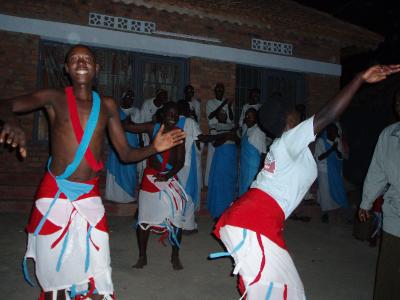 Our local dance troupe
Our local dance troupeTonight though I feel at home – to greet the board of directors there is a Rwandan traditional dance troupe and musicians and we dance under the bright starry African sky to the beat of the drums and the amazing voices raised high. African dance is so visceral there can be no thought of preserving any kind of dignity – you have to let yourself go and just move to the beating of the drums and clapping and singing. It’s beautiful and breathtaking and awe inspiring in a way so different than anything I have experienced before. There is such unabashed joyfulness in every move and sound.
Tomorrow will be more touring of the facilities – the mayor has expressed interest in my helping out at the local hospital which serves a population of almost 150,000 people and is staffed by only 2 doctors. The hospital receives the patients from the camp that are too ill to remain at the camp and I will be happy to oblige – although I once again get the feeling that I will be learning far more than I contribute.
There are a few things I would like to help get started – the HIV education / treatment at this camp, a health survey of children under 5 assessing nutritional status, growth parameters, continued basic hygiene issues… but these things will come – it’s still a delicate balance of not “taking over” but collaborating at every step of the way.
July 25, 2005 Monday, Ngarame
I have learned so much and seen so much in the past 5 days I feel like I might explode. I’m back under my mosquito netting, typing on my laptop. I’m not sure when I will be able to post these entries as the phone line has been disconnected and there is no way to obtain internet connection currently. Maybe tomorrow I’m told.
Today we started off in the Mayor’s office – a solid brick building just down the road from the “hotel” we are staying at. It’s his hotel in fact as well. It was hastily put together for the ARC team that was building the Nyabiheke refugee camp. The camp itself is truly *truly* a miracle – Put up in 3 months, exceeding W.H.O. Sphere standards in every respect.
The mayor is a little hard for me to read – but Barry and the ARC staff have nothing but good things to say about him and his participation in aiding ARC build this camp into the stone hills. He reveals that for 30 years of his life he in fact was a refugee himself – in Uganda and clearly identifies with those that are now forced from their homes.
He also reveals a bit about the “Gecaca” (pronounced Gachacha) process which is the reconciliation process Rwanda is going through from the 1994 genocide. I remember staring in horror at CNN as this was going on in 1994 and wondering why no one was stopping it. In much I have read since that time – we (we being the international community –those with the power in this world we live in). We *truly* failed the Rwandan people. This was not some remote tribal warfare that was too difficult for us to understand. This was a premeditated programmed extermination… a genocide – one which many swore to never allow happen again after WWII. Nearly one million dead…
But onward Rwanda must go and they have on their own set up these tribunals – made of 9 elected judges. Each week there are cases brought up from that time of the genocide and people testify on either side. If the perpetrators confess, their sentence is halved with half of that being done in community service. There is restitution made if possible, admission of guilt and the country acknowledges a painful history and finds a way to move forward. It is an obligation of all Rwandans to participate. Rulings must be by consensus of all 9 judges, not majority. It’s a process that the Rwandans are proud of – that they themselves are drawing on their own strength and determination to move forward - something that seems to be working at these early stages.
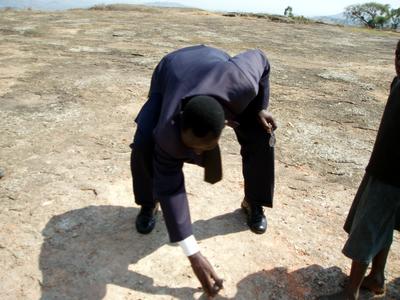 The mayor of Ngarame demonstrating the famous "hollow" rock
The mayor of Ngarame demonstrating the famous "hollow" rockWe then drive 100 meters (we are driven everywhere here…) down the street to the famous “rock” of the Ngarame area. The legend is that the King buried a drummer here – the center area of the large rocky mountain surface in a diameter of about 3 feet – when struck with another rock sounds hollow. Looking out at the mountainsides I can see where Rwanda got it’s name “land of 1000 hills” it’s so beautiful on top of this rocky slope, the air is crisp in the morning and the hillsides are still covered with trees in this area. I again get the distinct feeling of being at home.
Back up the bumpy dirt road to the camp where we attract such a crowd. The children all chant “muzungu” which means “white skin” at me and in a land where everyone is dark skinned there is no distinction between asian and caucasian – we are all just white skinned folk. There are more introductions and touring – so many formalities that must be followed. The camp is truly a wonder – very clean, the care in planning the camp and the pride in how it has come to fruition is evident on Barry’s face as he describes the water supply, latrine systems, cook stoves. The ARC headquarters is being built out of the stones dug from the ground – stone by stone, mortar mixed from cement and sand – it is the only non plastic sheeted building on the camp. “That’s where your office will be” says Barry…
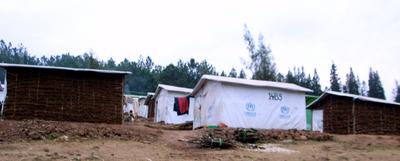 The camp shelters: the plastic sheeting is what UNHCR provides, some of the refugees fortify this with mud/stick reinforcements which makes the inside much cooler.
The camp shelters: the plastic sheeting is what UNHCR provides, some of the refugees fortify this with mud/stick reinforcements which makes the inside much cooler.2PM and it’s time to go back down to town where the mayor wants to introduce me to the physicians in the hospital. A cachement area of 150,000 plus people, 170 beds and 2 doctors – well one is largely an administrator so really only one clinician. The hospital facilities themselves are well built brick buildings and it is as clean as can be expected. It is bursting at the seams w/ malaria patients however – it has been a bad malaria season – the first room I am shown has 6 babies under 1 year old getting transfusions. On and on we see ward after ward of malaria with an occasional end stage AIDS, kwashiorkor, or TB thrown in for good measure. The doctor seems exhausted, in one ward 2 patients die as we are standing there rounding on the other patients…and 2 look very close to death.
I offer to help in any way I can but my French is still not strong enough for me to be too effective on my own. One nurse speaks English and it is perhaps with her I will be working. I don’t even know where to begin at this hospital – the method of practice is so foreign to what I am used to. There are laboratory facilities but pretty much everyone with a fever gets quinine infusion for malaria, and if the fever persists they next get hit with ampicillin and gentamicin or ciprofloxacin for good measure. I don’t really see a pattern of the reasoning but with 170 patients plus doing all deliveries and seeing consultations and 1 doctor I can’t say I can really fault their approach. There can be very little time for analytical thinking. I am exhausted by the time we finish our tour of the hospital. I offer to come back and round with him on Wednesday but I truly don’t know how much I can change in a place that is so overwhelmed and understaffed. The camp facilities seem a haven in contrast to this hospital.
Evening and there is time to absorb the setting sun on the porch of the hotel. I am reading and thinking and all the staff gathers for dinner where Theodore keeps us in stitches about the witchcraft / voodoo in his homeland of Benin – and promises to buy me a “love potion” when I visit him there, Henry the local governmental liason has stopped by for dinner and they begin a discussion of Rwanda and approaches to solving her problems. It is an inspiration and an honor to sit among 6 Africans (5 Rwandans and Theodore) and hear the love of their homeland and the hope in their voices as they try to plan a better future for their country, there is no talk of leaving for somewhere better it is talk of make there *here* better… it sends chills up my spine…
July 26, 2005 Tuesday Ngarame
3 days without internet access and I’m really starting to go through withdrawal. It’s funny how being here makes me realize the things I really absolutely rely on. I can go without running water easily – it’s amazing how clean you can really get with a very small amount of water… I’m not yet craving any particular food – even electricity I can go for the most part without, a phone I can take or leave – but an internet connection – a feeling like I am not alone “stranded” out here – that connection with my friends and family – not having that for the past three days has been ridiculously hard – it’s not something I thought I would miss this much…
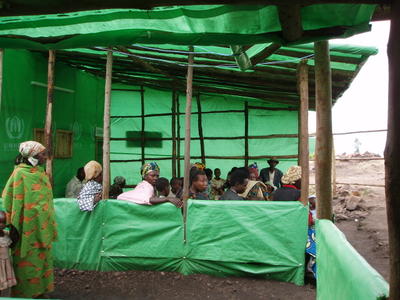 the waiting room of the camp health center
the waiting room of the camp health centerI am exhausted tonight. It was a full day of clinic at the camp – starting with rounding on our inpatients. 9 in all, 6 of them children. It will take a lot of gentle nudging from my side and understanding from the nurses but I think we will all move to the center. I find that the prevailing way of practicing medicine here is shotgun approach so that every child with fever gets quinine infusion for malaria, plus a dose of chloramphenical in case it is meningitis, plus possibly one or two other antibiotics. I guess w/o lab facilities you try to treat for the things that will kill and falciparum malaria and meningitis are definitely two of those things. Richard and Ben the two head nurses are quick studies though and it’s fun to start reasoning out clinical decision making with them.
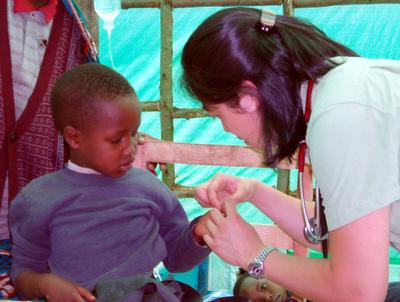 One of our many young patients (the camp is 55% children, there are 80 households headed by children <18)
One of our many young patients (the camp is 55% children, there are 80 households headed by children <18)I join Ben for the rest of the day in the pediatric consultation area – we see over 50 patients with the whole spectrum of disease – two of which we “admit” one for severe dehydration and one for likely malaria – failing outpatient treatment. No laboratory and no potassium even – so we make do with what we have – in the case of the severely dehydrated baby w/ ongoing diarrhea it means an NG tube with Oral Rehydration Solution. For the presumed malaria cases – it means adhering to the WHO clinical case definitions – and assuming all the malaria is plasmodium falciparum which is the most dangerous kind. We see two cases of what I am convinced is pertussis in babies and I cringe thinking about how quickly it will spread through the camp. We have no medical assistants so we do all the weighing and temperature taking ourselves and it really is a slow rather grueling process. Another thing to plan for – finding a few young people in the camp with some level of basic education and interest and training them to weigh, measure and take vital signs. It will be an invaluable contribution and cut our time needs in half. And it will give a skill back and be a lasting presence in the camp after I leave. Will need to talk to Theodore the camp manager about this. Also basic hygiene practices – getting the nurses to wash their hands between patients – granted that calstat is expensive but even a basin with some antiseptic solution to dip one’s hands in between patients should suffice.
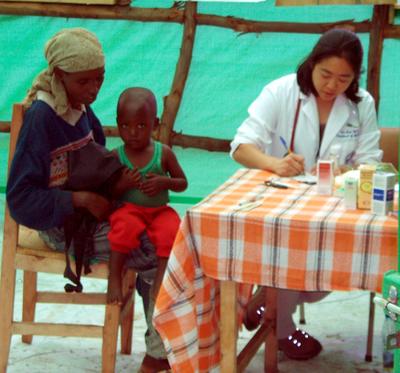 My exam room / office @ the camp
My exam room / office @ the campThere is so far to go – I can’t believe all that we are doing without even a microscope or ability to do any blood testing. The HIV proposal will be sent out in the next few days and depending on funding we may be able to have that project up and running. It’s hard to think about these huge global practice – shaping things when confronted with the rush of patients every day – some quite ill. I really want to carve out some time for teaching, but the patient load is such that we are all *exhausted* after getting home… I will give myself a little break though – it’s only my 3rd day in Nyabaheke.
Coming back to where we are staying a disturbing discovery – someone has stolen my sleeping bag, from right off the top of my bed. The door to my room has been locked most of the day – there was only a short time when it could have possibly even been taken – yet it’s definitely gone. I can’t imagine anyone taking it – but it is a desperately poor place and I can only suppose that the person who took it needed it more than I did – but I am still a little disappointed and sad especially after a long day. Tomorrow Clemence has said that I can use the phone line at the Mayor’s office – so I will end my internet drought and be able to post all of these messages… (probably longer and in far more detail than anyone wants to read…. But hey it’s *my* blog…)
July 27, 2005 Wednesday Ngarame
Arghhh… day #4 without internet access. I didn’t get back from the camp tonight in time to go to the mayor’s office. There was a glimmer of hope momentarily when Clemens told me that the phone line was working again – but while that was true – for whatever reason the dialup internet connection was *not* working. Well I know for sure I can get a connection tomorrow because I am going back to Byumba to liason with Dr. Moses and Kebe. I am chagrined and a little amused at how hard not having internet access is for me. As much as I feel like I have settled in – and as much as I am loving my time here- I really miss being in communication with everyone at home… and the internet makes it so easy to be away from home without losing touch…
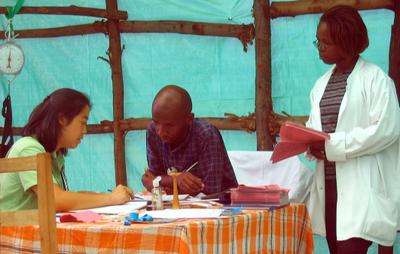 Morning "sign-out" reviewing last night's cases
Morning "sign-out" reviewing last night's cases Anyhow – another busy day – but starting to settle into a pattern. Morning rounds at the camp – it is gratifying to see all of our children doing better – I couldn’t sleep well last night because I was worrying about the last little 2 month old baby with the severe dehydration that I had admitted – without any labs or any way of ascertaining IV fluid rates- with a NG tube and a nurse not experienced in using it – with no way of communicating with me except sending a vehicle down a unpaved very long dirt windy road to actually physically come get me – all these things made me worry about how she’d be doing. She is definitely clinically improved although still having a large amount of watery diarrhea. I get to teach a little and explain oral rehydration to the nurses as we round and the importance of electrolyte repletion and the need to be very careful of IV infusions in small babies. They are all so eager to learn and rounding with them is truly a joy.
 Weighing a patient
Weighing a patientI did go back to the hospital in town this afternoon – which frankly I was dreading a bit. I get a little overwhelmed at the hospital with all the needs that are clearly not being met – yet it’s not “my” hospital (because I am starting to feel like Nyabaheke is “my” camp) and I don’t know how to best contribute. I had gone back briefly in the morning but Dr. Benon had an emergency c-section then cervical tear to repair so we had arranged to meet in the afternoon. Dr. Benon seems under so much stress – he speaks in nearly flawless English to me about how overwhelming the needs of the hospital are and how all the responsibilities fall on him. He still personally feels responsible for the deaths of any patient in his hospital … and so many die every day… he knows that it’s not his “fault” he says, but it still gets to him.
Even so, it is evident that he loves caring for patients and it is clear that his patients are very fond of him – greeting him along the walkways as we make our rounds. He takes me to his most complicated patients and we discuss the management – most of these patients look like end stage AIDS or TB patients and while there’s not too much to do – I’m able to make a few suggestions, and I think he just enjoys having a colleague to reason through things with – given that he is under such stress and time constraints that he doesn’t often get to think through the more complicated patients. . We agree that I will do “consultation rounds” with him every Wednesday morning and I am happy with that arrangement. I wish I could do more but my first commitment is to ARC and the refugees in Nyabaheke camp.
There are baby steps being made – a laboratory set up – I am promised – is a few weeks away, we are identifying 5 young men and 5 young women with some literacy to train as medical assistants, I have arranged with the district health coordinator for a mass vaccination to take place next Wed-Fri to vaccinate all the children under 5 (900 + children that age in this camp!!) and Ben, Richard & I are discussing how best to standardize nursing documentation in our “inpatients” in the camp – as there are no med sheets or vitals sheets…the HIV grant proposal will be finalized & submitted tomorrow, and everyone is *washing* their hands… at least when I am watching!
 Part of the Nyabaheke team. From L to R In back is Ben (assistant medical coordinator, nurse) then me, in front Clemens (assistant camp manager), Louise (Income Generation Project volunteer ARC), Theodore (camp manager), and Richard (medical coordinator, nurse)
Part of the Nyabaheke team. From L to R In back is Ben (assistant medical coordinator, nurse) then me, in front Clemens (assistant camp manager), Louise (Income Generation Project volunteer ARC), Theodore (camp manager), and Richard (medical coordinator, nurse)I am sad that Louise is leaving to go back to Minnesota tomorrow. She’ll ride with me back to Byumba then will go on to Kigali. It’s been so nice having another American here – she’s so committed to the Income Generation Project and “my” camp Nyabaheke is so ready for it – so many women interested in starting their own businesses. Louise will have to go back to the states to fundraise a bit to start up the project but promises to return in November with *funding* for some small business loans and training. So, SO *SO* desperately needed. Without her I will be the only non-African working at the camp… in fact as far as I know – the only non-African living in this region as it’s fairly remote although nothing in Rwanda by distance is that far apart – it’s just that there are only dirt roads so getting anywhere takes a bit of time… Well I really will *post* this tomorrow unless Byumba’s connection is also down…
